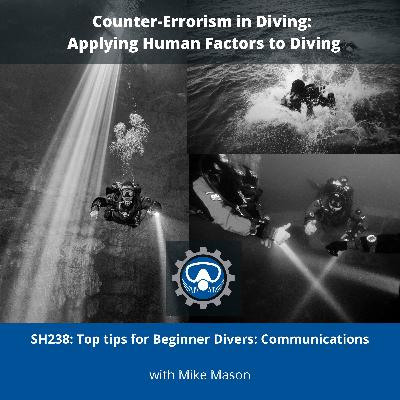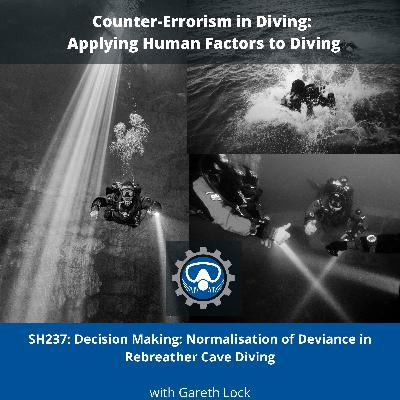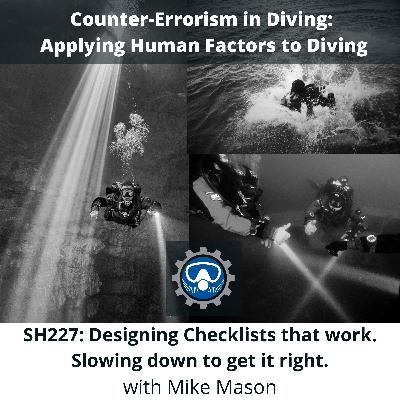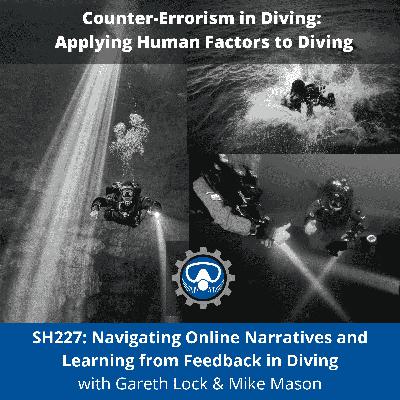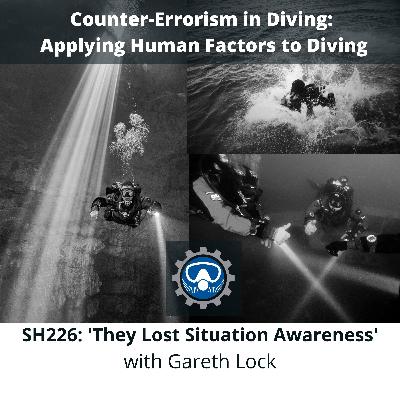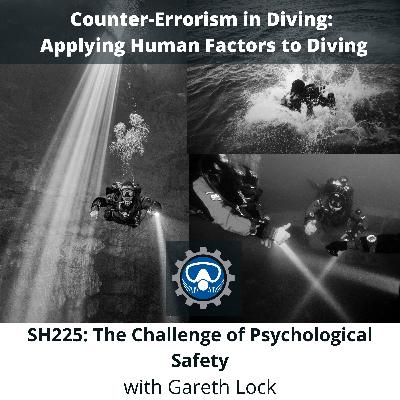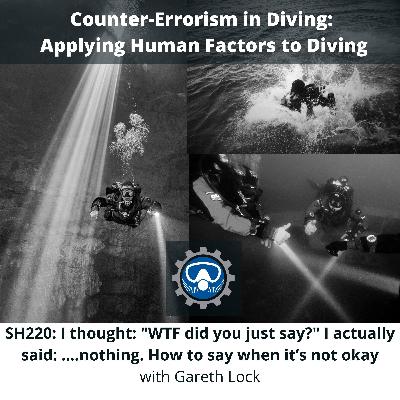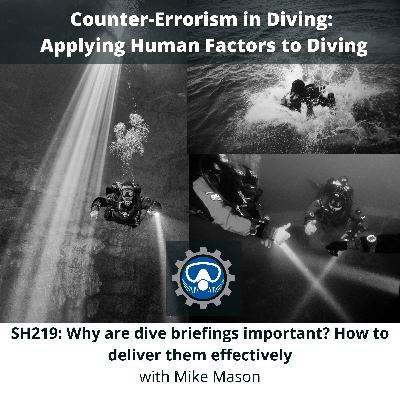Discover Counter-Errorism in Diving: Applying Human Factors to Diving
Counter-Errorism in Diving: Applying Human Factors to Diving

Counter-Errorism in Diving: Applying Human Factors to Diving
Author: Gareth Lock at The Human Diver
Subscribed: 9Played: 471Subscribe
Share
© 2025 (c) The Human Diver 2023
Description
Human factors is a critical topic within the world of SCUBA diving, scientific diving, military diving, and commercial diving. This podcast is a mixture of interviews and 'shorts' which are audio versions of the weekly blog from The Human Diver.
Each month we will look to have at least one interview and one case study discussion where we look at an event in detail and how human factors and non-technical skills contributed (or prevented) it from happening in the manner it did.
239 Episodes
Reverse
In this episode, we look at how a simple miscommunication during a fun dive turned into confusion, and why clear planning and shared understanding are essential for safe and enjoyable diving. Because you can’t talk underwater, communication has to start at the surface, and most problems come from assumptions, unclear plans, or people being too nervous to speak up. We break down practical tools to avoid this—like agreeing on the dive plan, using shared hand signals, confirming understanding, carrying a slate, and doing short debriefs after each dive. Good communication builds confidence, strengthens teamwork, and prevents small misunderstandings from turning into big issues.
Original blog: https://www.thehumandiver.com/blog/top-tips-for-beginner-divers-communication
Links: Shared understanding: https://www.thehumandiver.com/blog/lost-in-translation
Blog about psychological safety: https://www.thehumandiver.com/blog/the-challenge-of-psychological-safety
Ask questions: https://www.thehumandiver.com/blog/communications-ask-better-questions
Tags: English, Briefing, Communication, Communications, Mike Mason, Teamwork
In this episode, we explore how easy it is for divers to drift into unsafe habits when risky behaviour seems to have no consequences, especially in small or high-performing cave and technical diving teams. A real example from a cave rebreather class shows how a simple shortcut- only a few metres and seemingly low-risk- could have broken a key rule of always maintaining a continuous guideline. Even when a team is skilled and conditions look perfect, small deviations can become normalised and lead to bigger risks later. We talk about why psychological safety, honest communication, and clear team standards are essential for spotting drift, challenging unsafe ideas, and learning from each other.
Original blog: https://www.thehumandiver.com/blog/top-tips-blog-normalisation-of-deviance-in-rebreather-cave-diving
Links: Normalisation of deviance: https://www.thehumandiver.com/blog/normalisation-of-deviance-not-about-rule-breaking
Psychological safety: https://www.thehumandiver.com/blog/what-we-get-wrong-about-psychological-safety-in-diving
Tags: English, Cave Diving, CCR, Decision Making, Lanny Vogel, Normalisation of Deviance, Teamwork
In this episode, we finish exploring the “Dirty Dozen” human factors that contribute to mistakes in diving by looking at fatigue, lack of assertiveness and norms. These factors influence how divers think and behave, and they can increase risk if they aren’t recognised and managed. Fatigue can reduce focus and reaction time, lack of assertiveness can stop people from speaking up when something feels wrong, and unsafe norms can develop when teams skip important steps simply because “nothing went wrong last time.” We discuss how to address these issues through tools like HALT and PACE, building psychological safety, supporting each other as teammates, and challenging negative habits within dive communities. The goal is to create an environment where divers can speak up, look out for each other and make safer decisions together.
Original blog: https://www.thehumandiver.com/blog/reframing-the-dirty-dozen-part-4
Links: Part One: https://www.thehumandiver.com/blog/reframing-the-dirty-dozen-part-1
Part Two: https://www.thehumandiver.com/blog/reframing-the-dirty-dozen-part-2
Part Three: https://www.thehumandiver.com/blog/reframing-the-dirty-dozen-part-3
Error Producing Conditions: https://www.thehumandiver.com/blog/hf-for-dummies-part-9-error-producing-conditions
Building psychological safety: https://www.thehumandiver.com/blog/team-building-psych-safety-1
PACE tool: https://www.thehumandiver.com/blog/navigating-the-authority-gradient-pt2
Negative norms need to be recognised: https://www.thehumandiver.com/blog/what-are-we-pretending-not-to-know
Normalisation of drift vs pushing boundaries: https://www.thehumandiver.com/blog/drift-vs-advancement-how-do-we-push-limits-safely
Tags: English, Fatigue, Human Error, Jenny Lord, Performance Shaping Factors
In this episode, we continue exploring the “Dirty Dozen,” a set of human factors that can lead to mistakes in diving, by looking at pressure, lack of awareness, and lack of knowledge. These factors affect divers of all levels because they shape how we think, act, and make decisions underwater. Pressure—whether from time, money, or other people—can push divers into taking risks or rushing, while lack of awareness can cause them to miss important changes in their surroundings. Lack of knowledge, including not knowing what you don’t know, can lead to poor decisions or unsafe actions, especially in new environments or with unfamiliar equipment. We also discuss practical ways to manage these issues, such as improving skills so tasks become automatic, sharing responsibilities within the team, building a supportive culture, asking open questions, and staying curious about the “why” behind procedures.
Original blog: https://www.thehumandiver.com/blog/reframing-the-dirty-dozen-part-3
Links: Part One: https://www.thehumandiver.com/blog/reframing-the-dirty-dozen-part-1
Part Two: https://www.thehumandiver.com/blog/reframing-the-dirty-dozen-part-2
Part Four: https://www.thehumandiver.com/blog/reframing-the-dirty-dozen-part-4
Tags: English, Communication, Fatigue, Jenny Lord, Performance Shaping Factors, Situation Awareness, Stress
In Part 2 of this blog, we delve into three more of the "Dirty Dozen" human factors—stress, complacency, and lack of teamwork—and explore their impact on diver performance and safety. Stress, whether acute or chronic, can reduce awareness and decision-making ability, while complacency often arises in routine tasks, lowering vigilance. A lack of teamwork, meanwhile, undermines coordination and increases risks during emergencies. Practical countermeasures like using checklists, fostering psychological safety, and setting clear team goals can help mitigate these issues, creating safer and more effective dive environments.
Original blog: https://www.thehumandiver.com/blog/reframing-the-dirty-dozen-part-2
Links: HALT Model: https://www.thehumandiver.com/blog/stress-a-challenge-we-all-face
Becoming a team: https://www.thehumandiver.com/blog/practical-application-of-teamwork-in-diver-training
Building Psychological Safety blog series: https://www.thehumandiver.com/blog/team-building-psych-safety-1
UNITED-C: https://www.thehumandiver.com/blog/Why%20are%20dive%20briefings%20important%3F%20How%20to%20deliver%20them%20effectively
Part 1: https://www.thehumandiver.com/blog/reframing-the-dirty-dozen-part-1
Part 3: https://www.thehumandiver.com/blog/reframing-the-dirty-dozen-part-3
Part 4: https://www.thehumandiver.com/blog/reframing-the-dirty-dozen-part-4
Tags: English, Gareth Lock, Human Error, Human Factors, Jenny Lord, Teamwork
This week’s episode explores the interplay between human factors and system design in diving safety, using the “Dirty Dozen” as a framework to highlight key risks like poor communication, distraction, and lack of resources. While this list simplifies complex issues, it underscores how systemic challenges and individual behaviors intersect to create safety risks. The episode dives into practical countermeasures, emphasizing the need for teamwork, thorough preparation, and robust support systems to mitigate errors. By unpacking the context behind the Dirty Dozen, we aim to help divers and teams enhance safety, improve operations, and foster a culture of accountability and resilience.
Original blog: https://www.thehumandiver.com/blog/reframing-the-dirty-dozen-part-1
Links: LinkedIn Post from Gareth Lock: https://www.linkedin.com/posts/garethlock_mca-dirty-dozen-graphic-activity-7328740642400931840-tzS4/?utm_source=share&utm_medium=member_ios&rcm=ACoAAAELqPcBwf1_VKIPpplosn5XZ02d6xlOzRs
HFiD Applied Skills classes: https://www.thehumandiver.com/hfid-training-2025
Our brains process words faster than we can transmit or receive them
Checklists blog: https://www.thehumandiver.com/blog/designing-checklists-that-work-slowing-down-to-get-it-right
Normalisation of Deviance blog: https://www.thehumandiver.com/blog/normalisation-of-deviance-not-about-rule-breaking
Part 2: https://www.thehumandiver.com/blog/reframing-the-dirty-dozen-part-2
Part 3: https://www.thehumandiver.com/blog/reframing-the-dirty-dozen-part-3
Part 4: https://www.thehumandiver.com/blog/reframing-the-dirty-dozen-part-4
Tags: English, Communication, Gareth Lock, Human Error, Human Factors, Jenny Lord
This blog by Pedro Paulo Cunha explores the critical role of leadership in dive safety, highlighting how a toxic leader at a dive resort created a culture of fear, harassment, and stress that compromised both staff well-being and guest safety. Through the story of an experienced instructor facing verbal abuse and misconduct, the piece underscores the importance of psychological safety, just culture, and accountability in high-risk environments. It reveals how poor leadership eroded team confidence, increased errors, and damaged the operation’s reputation, offering valuable lessons for divers and managers alike. Leadership isn’t about rank but about fostering trust, communication, and resilience—qualities essential for safer and more effective dive operations.
Original blog: https://www.thehumandiver.com/blog/instructor-toxicity-why-one-bad-apple-spoils-the-bunch
Tags: English, Just Culture, Leadership, Pedro Paulo Cunha, Psychological Safety, Teamwork
Andrzej Gornicki reflects on the challenges of teamwork and organisation in diving operations, sharing lessons from his experience running a dive centre. Through real-life stories, he highlights how logistical oversights and errors—like forgotten equipment or missing supplies—can be mitigated with clear protocols and checklists. However, simply having checklists isn’t enough; they need to be embraced by the team. By involving staff in creating their own task-specific checklists and placing them strategically, Andrzej fostered accountability and improved efficiency. This episode dives into the balance between organisation, teamwork, and experience, showing how small changes can make big differences in safety and performance.
Original blog: https://www.thehumandiver.com/blog/what-do-you-mean-the-damn-box-is-missing-again
Links: Introducing checklists in diving: https://www.thehumandiver.com/blog/risk-management-in-diving
Amazon link ‘The Checklist Manifesto: How to Get Things Right’
Tags: English, Andrzej Górnicki, Checklists, Leadership, Teamwork
Psychological safety is more than a buzzword—it's a critical team skill in high-risk environments like diving. Often misunderstood, it's not about being nice or avoiding discomfort, but about fostering an environment where team members feel safe to speak up, question, and learn without fear of judgment. Through real-life examples, including a gas switch error during a dive, this episode explores the transformative power of psychological safety in improving communication, accountability, and team performance. Dive into how candid conversations, challenging feedback, and a culture of learning can make dive teams safer and stronger.
Original blog: https://www.thehumandiver.com/blog/what-we-get-wrong-about-psychological-safety-in-diving
Links: If Ony… documentary: https://www.thehumandiver.com/ifonly
YouTube presentation on the Linnea Mills
Blogs about PS from the Human Diver
Outcomes are a function of technical skills, context, skill/luck, and non-technical skills Youtube video
This article was written based on an HBR article by Professor Amy Edmondson & Michaela Kerrissey, "What People Get Wrong About Psychological Safety" (Harvard Business Review, May–June 2025)
Tags: English, Gareth Lock, Leadership, Psychological Safety, Teamwork
Join us as we dive into a fascinating debrief from a Human Factors in Diving liveaboard trip, where a challenging dive sparked discussions on team communication, decision-making, and safety. A sandy slope, strong currents, and mixed team responses led to valuable insights during the post-dive debrief, transforming frustrations into learning moments. With psychological safety at the core, participants improved their teamwork, communication, and situational awareness.
Original blog: https://www.thehumandiver.com/blog/debriefing-a-challenging-dive-a-real-life-experience
Links: Blog about the liveaboard: https://www.thehumandiver.com/blog/the-first-human-factors-in-diving-liveaboard
DEBrIEF model: https://www.thehumandiver.com/debrief
Tags: English, Debrief, Jenny Lord
Mike Mason explores how effective decision-making in diving depends on both intuitive (System 1) and analytical (System 2) thinking, highlighting the crucial role of checklists in bridging the gap between these systems. Checklists serve as prompts to prevent errors caused by cognitive shortcuts, ensuring safety-critical steps are not missed. Effective checklists should be simple, logical, and standardised, encouraging team coordination through techniques like point-touch-verbalise and peer checks. However, their value depends on proper integration into workflows and a culture that sees them as tools for managing human variability, not mere box-ticking. When used correctly, checklists enhance safety, accountability, and decision-making in high-risk environments.
Original blog: https://www.thehumandiver.com/blog/designing-checklists-that-work-slowing-down-to-get-it-right
Tags: English, Checklists, Decision Making, Decision-Making, Mike Mason
In this episode of The Human Diver, Mike Mason and I dive into the complexities of online storytelling, the double-edged nature of sharing experiences, and the power of constructive debriefing. We explore how narratives can both create learning opportunities and, at times, lead to misinterpretation, judgment, or defensive responses.
You will discover how high-risk industries like aviation use culture, structured debriefs, and role-based feedback to focus on behaviours rather than individuals. We discuss the importance of capacity, mental models, and situational awareness, and how these principles can translate into diving and online education.
Key Takeaways:
-Focusing on behaviours and actions, not people, fosters learning and reduces defensiveness.
-Online narratives can easily be derailed, so approach feedback with curiosity and humility.
-Capacity and situational awareness are critical in high-pressure environments and translate directly into diving.
-Constructive dialogue requires patience, perspective, and sometimes the use of tools like AI to frame responses effectively.
-Multi-perspective storytelling encourages empathy and a just culture, reducing judgment and promoting better understanding.
HF in Diving Conference 2026 www.hf-in-diving-conference.com
The blog by Betari Box https://www.thehumandiver.com/blog/my-attitude-impacts-your-behaviour
The phrase "loss of situation awareness" is often misused as a simplistic explanation for diving incidents, focusing on blame rather than understanding the context and contributing factors. Situation awareness involves perceiving the environment, comprehending its significance, and projecting future outcomes to make informed decisions. It can be compromised by factors like fixation, poor communication, or inadequate preparation. To improve situation awareness, divers should practice key skills on land, conduct thorough dive briefings, and engage in reflective debriefings to identify lessons learned. By moving beyond oversimplified explanations and fostering curiosity, divers can enhance safety and teamwork underwater.
Original blog: https://www.thehumandiver.com/blog/they-lost-situation-awareness
Links: UNITED-C model: https://www.thehumandiver.com/blog/Why%20are%20dive%20briefings%20important%3F%20How%20to%20deliver%20them%20effectively
Further reading: Situation Awareness and Mental Models
Selective Attention Exists! 5 Tips to Increase Situational Awareness in Diving
Unleashing Your Sixth Sense: Building capacity and directing attention
Running out of gas- Why does this happen and how can we prevent it?
How do I improve my Situation Awareness?
You can't pay MORE attention: the myth of 'loss of situation awareness'
Tags: English, Decision Making, Hindsight Bias, Incident Analysis, John Strobridge, Situation Awareness, Situational Awareness
Psychological safety is essential for building trust and fostering open communication in diving teams, yet creating it can be a challenge in high-pressure environments like open-water certification weekends. Helene Pellerine explores how leaders, particularly instructors, play a crucial role in setting the tone for a safe and supportive atmosphere where divers feel seen, heard, and free to share concerns or mistakes. By modeling openness, responding non-judgmentally to questions, and encouraging reflection, instructors can instill these values in students, who can then carry them into future diving experiences. While psychological safety can be nurtured in small moments, it requires ongoing effort to sustain and must be prioritized for safe and enjoyable dives.
Original blog: https://www.thehumandiver.com/blog/the-challenge-of-psychological-safety
Links: Building a Team (Stages 1-4) - Part 1 of 4
Building a Short-Term Team
HF in Diving for Dummies: Psychological Safety
Tags: English, Helene Pellerin, Leadership, Psychological Safety
In this episode, we examine a near-miss incident involving a CCR diver who narrowly avoided a hypoxic event during a liveaboard dive. Using this real-life scenario, we explore the importance of understanding human factors and causal reasoning in diving, focusing on how fatigue, stress, environmental distractions, and system design can shape performance and decision-making. We discuss the dangers of hindsight bias, the need to learn from "work-as-done" rather than idealized procedures, and how moving beyond blame helps identify systemic issues to improve safety and resilience. Tune in to discover how these lessons can help you dive safer and smarter.
Original blog: https://www.thehumandiver.com/blog/ccr-diver-goes-hypoxic-on-the-surface
Links: “If Only…” documentary: https://www.thehumandiver.com/ifonly
HFiD: Essentials class: https://www.thehumandiver.com/essentials-2025
HFiD: Masterclass: https://www.thehumandiver.com/masterclass-2025
More about the WITH model: https://www.thehumandiver.com/blog/don-t-just-focus-on-the-errors
Dirty Dozen Pre-Splash Checklist: https://thedirtydozenexpeditions.com/s/THD_DD-Splash-Checklist-40.pdf
Work as done vs work as imagined: https://youtu.be/vtgIwHrUWVQ?si=nKE--HgZPzMaJV7C
Diving Talks; Heroes and Villains in Diving: https://youtu.be/gXUhFLK2j3M
Video about the Linnea Mills case: https://youtu.be/3b1Mm8zXUow
Sign up for LFUO courses here: https://www.thehumandiver.com/lfuo
Tags: English, CCR, Gareth Lock, Incident Analysis, Just Culture
In this episode, we dive into the impact of human factors on decision-making in diving, focusing on how environmental elements like fatigue and cold temperatures can shape performance. We explore how jet lag from travel affects cognitive ability and the strategies to mitigate its effects, as well as how cold water impacts dexterity, buoyancy, and mental processing. With insights into the physiological and mental challenges these conditions create, we discuss practical steps to reduce their impact and emphasize the importance of awareness in making better, safer decisions underwater.
Original blog: https://www.thehumandiver.com/blog/the-effect-of-your-environment-on-your-decision-making-performance-shaping-factors-in-diving
Links: Diver performance and the effects of cold: https://journals.sagepub.com/doi/10.1177/001872086801000501
Tags: English, Guy Shockey, Performance Shaping Factors
In this episode, we explore the critical role of understanding hazards in diving and the importance of effective risk management. From the everyday threat of drowning to the more abstract risks like decompression sickness, we discuss how divers rely on equipment, training, and planning to mitigate dangers. The conversation highlights overlooked hazards like differential pressure (DeltaP), which can be deadly when misunderstood, as illustrated by tragic real-world examples. We also examine the psychology of risk normalization, emphasizing that ignorance of hazards can lead to complacency and tragedy. By raising awareness and promoting informed decision-making, this episode underscores the necessity of knowledge, preparation, and humility in diving safety.
Original blog: https://www.thehumandiver.com/blog/you-can-t-risk-assess-a-hazard-you-don-t-know-about-deltap
Links: Risk or Uncertainty blog: https://www.thehumandiver.com/blog/risk-or-uncertainty
Ignaz Semmelweis: https://en.wikipedia.org/wiki/Ignaz_Semmelweis
Video of a toy diver experiencing Delta P: https://youtu.be/uI0WOdX7cfU?t=350
Video of diver clearing lock gate: https://www.youtube.com/watch?v=MWGFEZ1tpsg
Incompetent and Unaware presentation: https://youtu.be/pGBYj1BNhvI?si=fioKreIdIS_5nX1F
Follow up video to lock gate clearance: https://youtu.be/nKp8duCNvyQ?si=-8jAyHQVGWTP8Ov7
Normalisation of risk blog: https://www.thehumandiver.com/blog/normalisation-of-deviance-not-about-rule-breaking
Differential pressure hazards in diving - Diving Information Sheet No. 13Delta P ADCI Checklist
Tags: English, Decision-Making, Gareth Lock, Risk, Risk Management
In this episode, we explore how a liveaboard trip in Indonesia integrated Human Factors training to transform the diving experience. Jenny Lord from The Human Diver, Brent Webb from Scuba Adventures in Texas and Mark from Master Liveaboards collaborated to create a unique environment focused on psychological safety, teamwork, and debriefing. Over a week, 19 divers, with varying levels of Human Factors training, participated in engaging talks on topics like decision-making, situation awareness, and leadership, alongside dive debriefs that fostered shared understanding and growth. The trip highlighted the power of open communication, self-reflection, and learning from mistakes, leaving participants inspired to bring these skills to their own diving practices and beyond.
Original blog: https://www.thehumandiver.com/blog/the-first-human-factors-in-diving-liveaboard
Tags: English, Communication, Debrief, Jenny Lord, Learning, Psychological Safety
Speaking up when something feels off—whether on the dive boat, in a briefing, or underwater—is key to building a safe and inclusive dive culture. In this episode, we explore how small interventions, from a simple pause to a well-placed question, can shift group dynamics and reinforce psychological safety. Using real-world diving scenarios, research-backed strategies, and insights from human factors, we discuss how to challenge problematic comments without escalating conflict. Tune in to learn how small moments can shape dive team culture and why speaking up, even subtly, can make a big difference.
Original blog: https://www.thehumandiver.com/blog/wtf-did-you-just-say-i-said-nothing
Links: Reel from Kenny Dyal and Sweetwater Scuba: https://www.facebook.com/reel/1385836736105494
Blog from Nic Emery: https://www.thehumandiver.com/blog/what-are-we-pretending-not-to-know
Psychological safety blogs from THD: https://www.thehumandiver.com/blog?tag=psychological+safety
“How to say when it’s not ok” paper: https://www.lboro.ac.uk/media/media/campaigns/iwd/how-to-say-when-its-not-okay.pdf
THD wetnotes: https://the-human-diver.myshopify.com/collections/frontpage/products/thd-wetnotes-divers-notebook
Asch conformity experiments: https://www.youtube.com/watch?v=tEhABrJ4T2Y
Tags: English, Communications, Gareth Lock, Leadership, Psychological Safety, Teamwork
Effective dive briefings are key to safe and successful dives, yet many divers overlook their importance. In this episode, we explore how structured briefings help build a shared mental model, reducing misunderstandings and improving team coordination. Using the UNITED-C framework—covering goals, roles, risks, contingencies, and more—we break down how to deliver clear, effective dive briefings that set your team up for success. Tune in to learn how small changes in briefing style can enhance safety, teamwork, and overall dive experience.
Original blog: https://www.thehumandiver.com/blog/Why%20are%20dive%20briefings%20important%3F%20How%20to%20deliver%20them%20effectively
Links: Get The Human Diver wetnotes here: https://the-human-diver.myshopify.com/collections/frontpage/products/thd-wetnotes-divers-notebook
Tags: English, Brief, Mike Mason, Team, Teamwork


